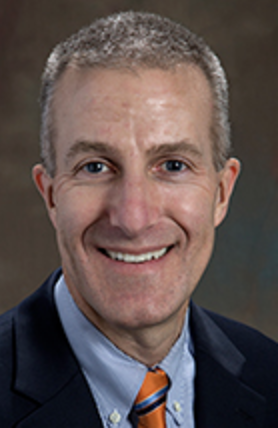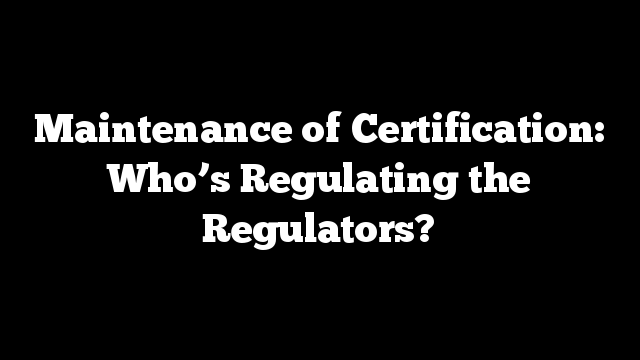 When four physician certification boards founded the American Board of Medical Specialties (ABMS) in 1933, those forward thinking organizations—and their professional society sponsors—launched a national movement toward ever increasing physician accountability. Back then, quackery was rampant, so “board certification” meant a lot to patients. The ABMS has since grown to 24 member boards, all ostensibly dedicated to serving “the public and the medical profession by improving the quality of health care through setting professional standards for lifetime certification.”
When four physician certification boards founded the American Board of Medical Specialties (ABMS) in 1933, those forward thinking organizations—and their professional society sponsors—launched a national movement toward ever increasing physician accountability. Back then, quackery was rampant, so “board certification” meant a lot to patients. The ABMS has since grown to 24 member boards, all ostensibly dedicated to serving “the public and the medical profession by improving the quality of health care through setting professional standards for lifetime certification.”
Because information and technology now advance so rapidly, those one-time lifetime certificates from years ago may no longer be enough. A doctor who passed a test in 1990 isn’t necessarily competent today. The boards have thus changed their approach to certification; for newly minted physicians, time-limited (e.g., 10 year) endorsements now replace the lifetime ones granted to their predecessors. Initially contingent on additional examinations each certification cycle, these newer time-limited endorsements now additionally require ongoing participation in Maintenance of Certification (MOC®) programs.
MOC® has since blossomed into a massively bureaucratic and lucrative industry. Hundreds of commentaries by physicians lament this costly, ever expanding, and burdensome leviathan. Top selling magazines and books have also jumped on the criticism bandwagon. Salacious stories of alleged financial impropriety plaguing the American Board of Internal Medicine now cast shadows of distrust over its brethren boards, which have collectively amassed a half-billion dollar war chest thanks to their newfound annuity called MOC®. All the while, credible evidence demonstrating that MOC® meaningfully improves patient care remains scant at best.
The ABMS claims that each member board “is a physician-led, non-profit, independent evaluation organization whose accountability is both to the profession and to the public.” In reality, though, there is little accountability—to either physicians or the public. Accountability is largely illusory, with certification boards answering only to their ABMS fraternity brothers. As a result, ever changing board mandates go unchecked, as the ABMS proudly proclaims that “boards are not membership societies.” Translation: “we are beyond reproach.”
But that’s not true. There are, in fact, very real mechanisms by which physician professional societies can hold their sponsored boards accountable—but only if they so choose. Remember, those boards were founded with the sponsorship of the American Medical Association (AMA) and many other professional societies. Some boards, including my own, prominently highlight those sponsors on their websites, publicly connoting ongoing endorsement. Those sponsoring societies, however, demand no formal, transparent, and ongoing accountability of the boards that so proudly leverage their brands. If a sponsor truly “assumes responsibility for some other person or thing,” then professional societies must reconsider prior decisions to assume responsibility for the boards their dues-paying members increasingly vilify and distrust.
The ABMS member boards have all made it clear that one-time physician certification is inadequate to ensure lifetime accountability. If so, then isn’t one-time sponsorship inadequate as well? If MOC® is a good and righteous mechanism of ensuring accountability, then MOS (Maintenance of Sponsorship) should be good and righteous as well.
Here’s the crux of MOS: if a board wants a professional society’s ongoing sponsorship, then it needs to play by that society’s rules. MOS, like MOC®, is essentially brand licensing—and based on MOC®’s four-part roadmap:
- Professionalism and Professional Standing. As with physician state licensure, boards seeking ongoing sponsorship would need to demonstrate good standing with the ABMS or the National Board of Physicians and Surgeons (NBPAS).
- Lifelong Learning and Self-Assessment. For physicians, this is MOC®’s mandatory continuing medical education (CME). Under MOS, all directors of sponsored boards would annually be required to attend 25 hours of targeted education to ensure familiarity with the contemporaneous and varied practices of those they’re certifying, as well as the financial and administrative ramifications of the regulations they impose. Further, board leaders should undergo approved real-time testing on this content, akin to physician self-assessment CME (SA-CME) now mandated under MOC®.
- Assessment of Knowledge, Judgment, and Skills. Initial and ongoing examinations are the cornerstones of physician certification, and even today, many are administered orally. So, as a condition of ongoing sponsorship, the AMA and other professional societies should require directors of sponsored certification boards to participate in open panel discussions, and be “tested” by professional and public stakeholders on their knowledge of real world practice, judgement, and communication and leadership skills—and be scored accordingly. If the public is to trust these individuals to police physicians, then it deserves to know if they are worthy of that trust.
- Improvement in Practice. MOC®-imposed quality improvement projects are essentially self-research, intended to help physicians improve upon things they’re doing in their own practices. Under MOS, sponsored boards would similarly be required to undertake credible research to show how they’re performing. I, for one, eagerly await evidence showing that MOC® improves patient outcomes.
Unlike MOC® rules developed in smoke-filled back rooms, MOS would be an inclusive, open, and fully transparent process to ensure that boards are truly accountable to “both to the profession and to the public.” Physicians, patients, and other stakeholders could all participate in public MOS rulemaking. And, as a condition of ongoing professional society sponsorship, boards would be subject to equally open scrutiny of all new and ongoing initiatives, requirements, and regulations. Any certification board, of course, could simply decline to pursue sponsorship. The resulting accountability silence would, however, be deafening.
If MOC® really ensures professional and public accountability, then we need to take it a step further and pursue MOS post haste. But, if MOS is deemed fundamentally unwieldy, ineffective, or just plain silly, then it’s time reflect more carefully on its predicate MOC®—and whether our boards remain true to the guiding missions of their visionary founders. Real accountability cannot be a one-way street.
Richard Duszak, Jr., MD (@RichDuszak) is Professor and Vice Chair of Radiology at Emory University and Associate Editor of the Journal of the American College of Radiology. He was recently recognized by the American Board of Radiology with its Volunteer Service Award for his many years of dedicated work as an oral examiner and examination creation and evaluation committee member.
